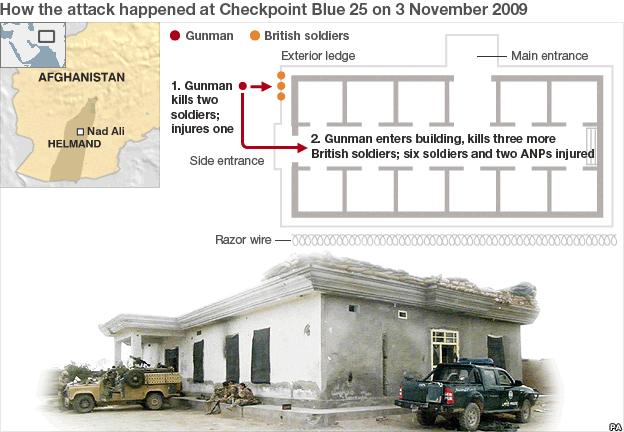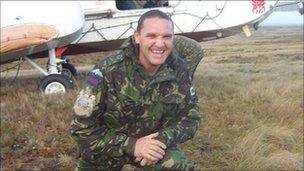Afghan shooting: Soldiers were 'unlawfully killed'
- Published
Families pay tribute to the soldiers and react to inquest
Verdicts of unlawful killing have been recorded on five British soldiers who were shot and killed by a rogue Afghan policeman in 2009.
But the Wiltshire and Swindon coroner David Ridley said the government had not failed in its duty to "avoid risk".
Concerns had been raised before the attack over the behaviour of the gunman, who later fled a checkpoint in Helmand province's Nad Ali region.
Corporal Nick Webster-Smith's family hoped "lessons had been learned".
The gunman, named only as Gulbuddin, escaped afterwards.
Brigadier James Cowan, the then senior commander in Helmand, told the inquest the deaths had been shocking but had given him enough leverage to get the authorities to reform the Afghan National Police (ANP).
Three of the soldiers killed were Grenadier Guards - Warrant Officer Class 1 Darren Chant, 40, from Camberley, Surrey, Sergeant Matthew Telford, 37, and Guardsman Jimmy Major, 18, both from Grimsby, north Lincolnshire.
The other two killed were Royal Military Police - Corporal Steven Boote, 22, from Birkenhead, Merseyside, and Corporal Nicholas Webster-Smith, 24, from Brackley, Northamptonshire.

Six British soldiers and two Afghan policemen were wounded when Gulbuddin opened up with an AK-47 machine gun.
The coroner had been asked to make a ruling about whether the soldiers' rights under Article 2 of the European Convention on Human Rights had been breached.
The article gives an obligation on the UK to protect life but Mr Ridley ruled that the UK had not failed because WO1 Chant had not had "effective control" of the checkpoint.
A solicitor, Mark Fielding, representing the families of Sgt Telford and Guardsman Major, said: "They remain amazed that their loved ones were put in such avoidable harm's way by the Ministry of Defence, and they are sad that several crucial opportunities were missed to identify Gulbuddin as a threat and so remove him from the checkpoint.
"The families are glad however that the Ministry of Defence has learnt some important lessons as a result of this incident and that their boys did not die in vain.
"But they are very sad that it took this wholly avoidable incident and the resulting appalling loss of life to cause those steps to be taken."
Cpl Webster-Smith's family said he had been "murdered" and in a statement after the inquest added: "We remain convinced this was not an isolated incident by a lone gunman but a co-ordinated attack by the Taliban.
"As a family, we hope that lessons have been learned and that the questions raised at this inquest will be acted upon," they added.
'Rotten to the core'
Cpl Boote's mother, Margaret Boote, and his girlfriend, Emma Murray, made a statement afterwards in which they said: "We are convinced that the investigation has been thorough and we have had all of our questions answered.
"The only person to blame for Steven's death is the rogue Afghan National Policeman who committed this cowardly act and we still won't know what motivated him but we would now like to be left alone to grieve in peace."

Warrant Officer Class 1 Darren Chant was in line for a top job at the Army's Sandhurst academy
The coroner said it was known there were problems with the ANP and Lieutenant-Colonel Charles Walker, commanding officer of the 1st Battalion Grenadier Guards, had described them as "rotten to the core".
The ANP were poorly paid and many smoked opium and cannabis, were insubordinate and ill-disciplined and would often swear at the British soldiers, the inquest heard.
Strange behaviour
The inquest heard Gulbuddin was known as Errol Flynn or Pretty Boy by the British troops because of his moustache and camp behaviour.
In the weeks before the shootings he had touched the bottoms of several soldiers and grabbed one in a headlock.
The inquest heard he was in a "strop" on the day of the shootings, having been told off for not wearing his police-issue hat.
He said WO1 Chant had raised concerns about Gulbuddin's behaviour, discipline and drug taking before the attack.
Mr Ridley said WO1 Chant discussed these issues with the ANP commander before the attack and was told they would be addressed.
The coroner says WO1 Chant was highly regarded and if he had not been killed he would have been considered for the top sergeant major position in the British Army at Sandhurst.
His widow, Sheenie Chant, said: "This inquest has reinforced what I already know about him. He led from the front, that this will not be the final chapter for him - his heart still beats through our beautiful son, George, who will know his father through his legacy."
The coroner said there was no real way of knowing the motivation for the attack.
Lance Corporal Liam Culverhouse, who was blinded in one eye, "played dead" after being shot in the face, arms and legs.
He said: "All I heard was a rifle going off in automatic bursts and Gulbuddin shouting something that was like a war cry.
"All I could hear was gunfire, scream, gunfire, scream, gunfire, scream, and then it all stopped."
'Brave men'
Lt Col Walker said: "After a thorough and harrowing inquest by a wise coroner into events which took place many months ago, far away in Afghanistan, I believe we all have a much clearer picture of the circumstances that led to the death of Darren Chant, Matthew Telford, James Major, Steven Boote and Nicholas Webster-Smith. Brave men, they suffered the cruellest of deaths, so undeserving for the good they were doing."
Major General John Lorimer, Chief of the Defence Staff strategic communication officer, said: "Throughout our time in Afghanistan we have been working closely with the Afghans to build a credible security force so that they can take the lead security responsibility at the end of 2014."
He said: "We are making excellent progress on developing the Afghan National Security Forces and are currently ahead of schedule for meeting the target of 171,600 Afghan army and 134,000 Afghan police by the end of 2011.
"This will ensure the long-term security and stability of the country, allowing us to redeploy UK troops back home."
- Published18 May 2011